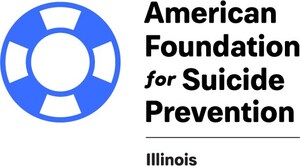The American Foundation for Suicide Prevention and The Dougy Center Join Forces, Launch New Education Resource for the Families of Young Suicide Loss Survivors
NEW YORK, Feb. 9, 2017 /PRNewswire-USNewswire/ -- Each year, more than 44,000 Americans die of suicide according to the Center for Disease Control and Prevention. In the aftermath, families are often left struggling to cope with a suicide death. The American Foundation for Suicide Prevention and The Dougy Center, the National Center for Grieving Children & Families, have developed Children, Teens and Suicide Loss, a new guidebook designed specifically to help families with children and teens, who are survivors of a suicide death, better address their complex practical and emotional needs.
"Families who are grieving after a suicide loss often experience an intense and complicated grief. Guidance, support and sense of connection can make all the difference, especially when it comes to addressing the needs of grieving children and adolescents," said Dr. Christine Moutier, AFSP's Chief Medical Officer. "This new resource offers practical advice on guiding young people through grief after a suicide loss, and creating techniques for children and teens to cope in settings like attending a funeral and returning to school. It's our hope to provide tools for their healing journey together."
"The suicide death of a parent, sibling, or friend impacts children and teens forever. Children, Teens and Suicide Loss offers useful suggestions and practical ways to support bereaved children and their families. Included are tips on understanding and explaining why people die of suicide, navigating the immediate aftermath of the death, and ways to facilitate healthy grieving. This resource will help parents, professionals who work with children and teens, as well as anyone who wants to support a family bereaved after the suicide death of a loved one," said Donna Schuurman, Ed.D, F.T., Senior Director for Advocacy and Training of The Dougy Center for Grieving Children & Families.
Some highlights from the book include how to:
- Speak honestly and openly about the death. When faced with telling a child about a suicide death, be clear and honest. Use gentle yet plain and specific words to describe what happened.
- Listen. Simply let the child talk and try not to assume what the child may be thinking or feeling.
- Be open to different ways of grieving. Just as with adults, children express their feelings in their own ways. It may not look like what we'd expect; allow them freedom to feel their emotions.
- Offer choices. Death is an uncontrollable force, leaving people feeling powerless and out of control. When possible, find opportunities for grieving children to have input into decisions.
- Provide outlets for self-expression – activities like drawing, writing or playing music. Offer resources for creative outlets, without dictating the expression.
- Talk about and remember the person who died. Affirming the child's memories and perceptions of the person who died will help keep conversation open, which in turn helps the child to continue processing their experience of grief.
- Get extra help if needed. After some time, most children will return to normal routines and activities. But sometimes additional challenges arise, so don't be afraid to seek further guidance.
- For information about this guidebook, and other loss survivor programs, please visit: Resources for Loss Survivors.
The Dougy Center was founded in 1982 by nurse Beverly Chappell in tribute to Dougy Turno, a young boy who died of an inoperable brain tumor at age 13. The Dougy Center is widely regarded as an international leader in the field of childhood bereavement. In 35 years of service, The Dougy Center has provided support groups to over 40,000 children, teens, young adults, and their family members, and provided interventions to thousands of communities in response to tragedies such as the Umpqua Community College shootings, 2001 World Trade Center bombings, the 2010 earthquake and tsunami in Japan, and the Newtown, Connecticut elementary school shootings. The Dougy Center has responded to over 17,000 information, crisis, intake, and referral requests; and nearly 4,000 people have been impacted by Dougy Center trainings in the community in 2015-16. This year alone, 1,906 children and families received free support services at one of the Dougy Center's three Oregon locations in Portland, Hillsboro, and Canby. Learn more about The Dougy Center at dougy.org, Facebook, Twitter and YouTube.
The American Foundation for Suicide Prevention is dedicated to saving lives and bringing hope to those affected by suicide. AFSP creates a culture that's smart about mental health through education and community programs, develops suicide prevention through research and advocacy, and provides support for those affected by suicide. Led by CEO Robert Gebbia and headquartered in New York, and with a public policy office in Washington, D.C., AFSP has local chapters in all 50 states with programs and events nationwide. AFSP celebrates 30 years of service to the suicide prevention movement. Learn more about AFSP in its latest Annual Report, and join the conversation on suicide prevention by following AFSP on Facebook, Twitter, Instagram, and YouTube.
SOURCE American Foundation for Suicide Prevention
Related Links
WANT YOUR COMPANY'S NEWS FEATURED ON PRNEWSWIRE.COM?
Newsrooms &
Influencers
Digital Media
Outlets
Journalists
Opted In





Share this article